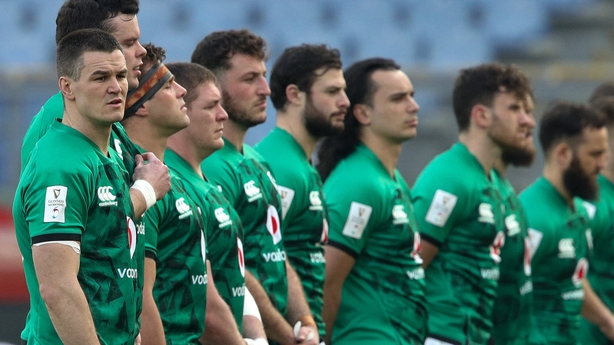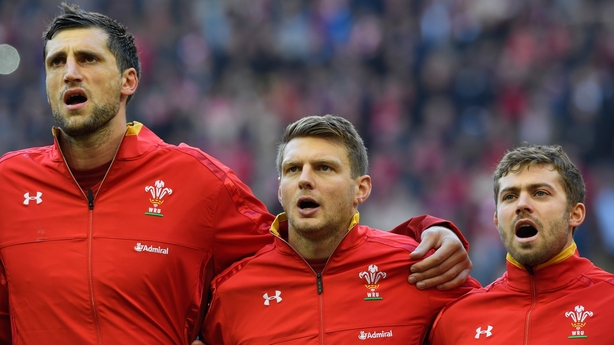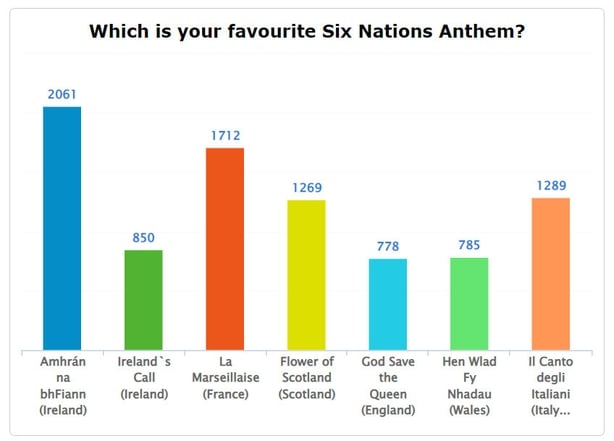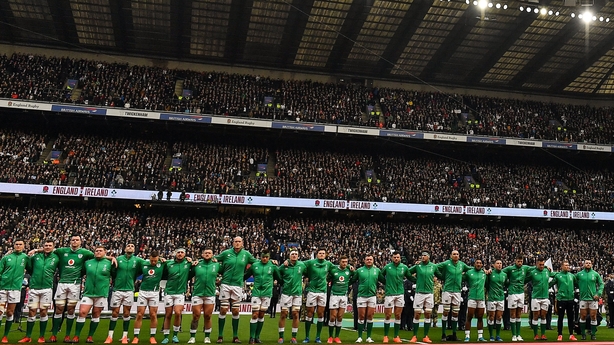Just after 2pm this afternoon, Johnny Sexton will lead Ireland out against Wales and a man bursting with the pride of representing his country has to find the right balance between emotion and dispassion.
Fire in the belly, ice in the mind.
"You are trying to think about the first play but it is an emotional time," the captain told RTÉ Sport this week when asked about standing for Amhrán na bhFiann and Ireland's Call.
"You are standing in front of your country and everyone is watching you.
"Your family and friends are right in front of you, you can see them, you can pick them out in the crowd.
"It can be a very emotional time so it can be a challenge to focus on the first play and sometimes you need to feed off the emotion.
"Other times you need to stay calm and think about the first moments of the game. It’s a mixture of all those things really."

Sexton’s opposite number today is Dan Biggar, who also captains the visitors in the absence of Alun Wyn Jones.
He'll win his 96th cap and admits that how he has dealt with Land of our Fathers over his 12-year international career has changed.
Hen Wlad Fy Nhadau won’t have the same resonance as it does in a packed Principality Stadium, and Biggar admits part of his brain will be in game mode.
"Certainly, when I first started it was more so about the real excitement, and the real passion and energy, picking up off the crowd and the enormity of singing the anthem in front of 70,000," he said.

"Not that any of that has changed in terms of passions and excitement, I actually spend a little more time during that anthem now thinking about where the first kick-off is going to go.
"It gives me five or ten minutes when the anthems are going on to gather my thoughts and tick everything off from a technical side; first lineout call, first kick-off, first play, first scrum, whatever it is it just gives me a little bit of time.
"I tend to use that, now I've got a little bit...it’s not such a novelty of excitement and passion, it’s probably a little bit more practical in terms of thinking what’s needed for the team to start the game off.
"Those moments there are the real exciting moments when you are just waiting for kick-off and you hear the anthem, yeah, very special moments there."

Irlande, douze points.
For the weekend that's in it we asked users of our website to vote for their favourite in this survey.
The jury has spoken and it's Ireland's national anthem that is the most popular of the seven Six Nations tunes.
Unlike the Eurovision Song Contest, however, we estimate that a high percentage of the 6,856 voters (as of late last night) came from this island and may be somewhat biased.
Considering it's a song that only gets either two or three plays a year in the championship, it’s a good result.
Ireland, of course, are unique among the participants, in having two songs played before their home games.
On the road, Amhrán na bhFiann doesn’t get an airing.
The fact that some players don’t sing it, some players won’t sing it and some players chew gum loudly during it, hasn’t prevented it from topping the poll with a handsome lead from the French national anthem.
Whether it's the popularity of the film Casablanca, Father Jack's reaction to it in that episode of Father Ted, or just the sheer passion that it's sung with, Le Marseillaise, is popular among Irish voters.
The Ulster fans even have their own version for when an opposing player fumbles the ball (Knock on, knock on, you knocked on the ball).
It's ten points for that one.
The lyrics of that little ditty, penned during the French revolution, are not for the faint-hearted, what with talk of watering the fields with the blood of tyrannical invaders and such.
"When we sing Le Marseillaise, it's always about personal emotions, it reminds you of friends, parents, schoolteachers," France centre Gael Fickou told RTÉ Sport.
"They are very emotional moments, at the last moment before the game starts, when we are all close to one another and singing Le Marseillaise.
"Afterwards we will start playing against our adversary. It’s the last emotional moment before the game starts and it’s always a very moving moment, especially when we sing A capella, singing along with the crowd, it’s a very emotional, very strong."
Flower of Scotland, perhaps surprisingly, gets pipped for third by Brothers of Italy, both with themes of not really liking outsiders.
The choirs of Cardiff and the Welsh valleys will not be happy even though they avoided the wooden spoon thanks to a late surge of votes. They will feel that they have a much better anthem than England and that its true value hasn't been reflected on the scoreboard.
In this poll, Ireland’s Call has just beaten God Save the Queen, not a traditional favourite over here to say the least.

The song was written by Phil Coulter back in 1995 as a number that all four provinces could all get behind.
While The Soldiers Song was played at home games in the Republic of Ireland for years, the IRFU commissioned a new anthem to accommodate many of the players from Ulster, who generally came from a Unionist background.
In his recent book, Willie Anderson, Tyrone man and former Ireland captain, said that Amhrán na bhFiann was "no more than an irritant. Better men than me had coped with it."
But Ireland's Call has been a success, to a point. It can be easily derided – anyone who follows the Late Late Show on Twitter might have seen quite a few smart-alec comments on their post last week when the audience was whipped up into a frenzy by Ryan Tubridy.
It's not universally loved but it’s practically accepted across the board.
"I wasn't a great fan," said former Ireland captain Donal Lenihan in his book, "But I understood and accepted the concept."
But it can be hard not to look at the French and the Scots and the Welsh and the Italian teams standing together, to a man, belting out their respective national anthems without wondering if Ireland could also benefit from one song.
The IRFU is happy enough with it, however. They have no plans to see how Danny Boy, for example, would go down in Dublin 4.
"The current approach continues to work," the union says.
And the recent evidence is persuasive.
This may be recency bias, but it was sung with gusto by all of the squad before the win over New Zealand, and the supporters, long denied live international rugby, seemed to get into it more, too.
Phil Coulter said the song was always going to be a "slow burn" in terms of winning the crowd over and former Ireland skipper Brian O’Driscoll admitted that it took him some time learn to accept it.
"I was like 'pffft, Amhrán na bhFiann is really my anthem," he said before his mother persuaded him to look at it in a different way.
"She was right...it was my duty to try and be part of something that incorporates everyone."
Sexton said he doesn’t prefer one over the other: "No, I suppose I’m very lucky in that I’ve played a lot of games at home for Ireland so I’m used to both of them.
"I think they are both unique and I’m very proud to sing both of them and that’s it really."
Listen to the RTÉ Rugby podcast on Apple Podcasts, Soundcloud, Spotify or wherever you get your podcasts.
Follow all of Ireland's Six Nations games via our live blogs on rte.ie/sport and on the RTÉ News App or listen to live radio coverage on RTÉ Radio 1. Watch live TV coverage of Ireland v Wales (5 February, 2.15pm) and England v Ireland (12 March, 4.45pm) on RTÉ2 and the RTÉ Player.







